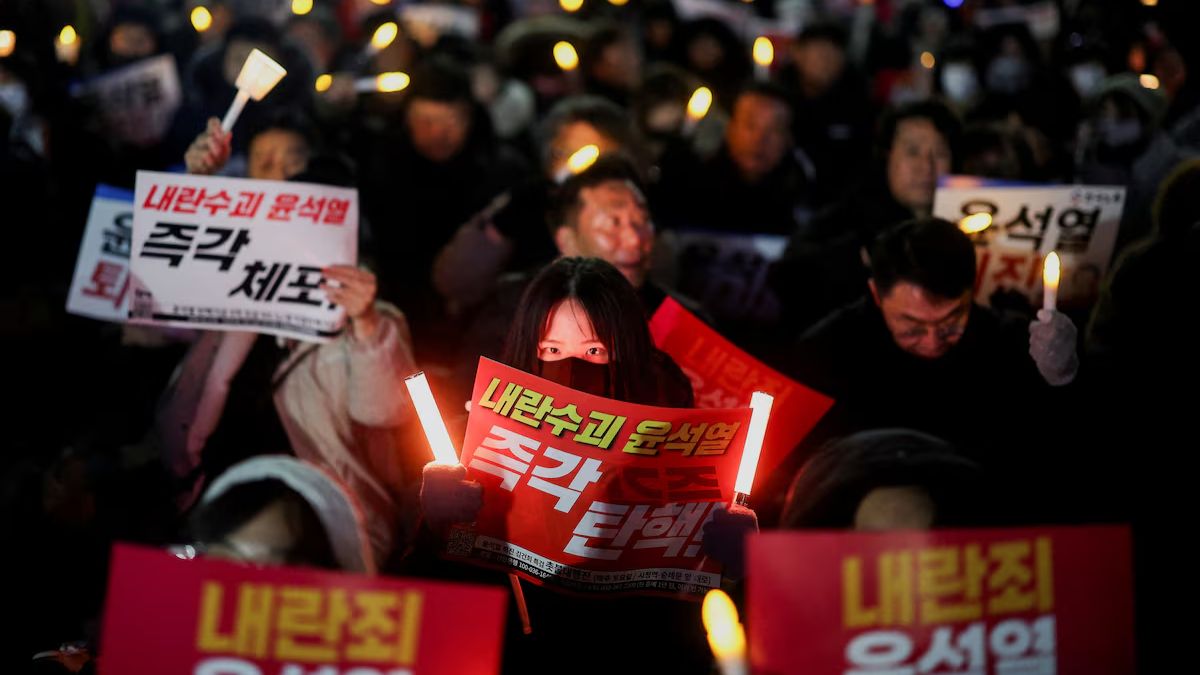South Korean President Yoon Suk Yeol stunned the nation and the international community when he imposed martial law and sent troops and helicopters to the parliament.
But what followed was an unexpected twist—after a night of drama and protests, Yoon was forced into a swift U-turn when lawmakers rejected his decree.
The opposition, seizing the opportunity, swiftly introduced an impeachment motion against Yoon in the Parliament. However, the motion failed on Saturday as members from Yoon’s People Power Party (PPP) boycotted the vote, and walked out of the chamber.
Opposition parties, which hold 192 seats in the 300-seat parliament, filed the impeachment motion that needed 200 votes to pass. But almost all 108 members of PPP filed out, while only three of them cast ballots.
The speaker, Woo Won-Shik, even called on the PPP lawmakers to “protect the Republic of Korea and its democracy”, however, his appeal fell on deaf ears as they failed to return and voting failed to take place.
How did the political drama unfold this week in South Korea? Here’s a closer look.
The lead-up
Yoon, elected in 2022, lurches from crisis to crisis and becomes a lame duck after the opposition wins control of parliament in elections in April this year.
For months, some opposition lawmakers accuse Yoon of a slide towards authoritarianism.
One lawmaker, Kim Min-seok, in September even claims that Yoon has martial law in mind, but almost no one takes it seriously.
Yoon’s midnight shocker
On Tuesday at 10:23 pm, (1323 GMT) Yoon comes on screen to declare martial law to protect South Korea from “communist forces”.
Yoon, who has been in a legislative dispute over next year’s budget, says the opposition had “paralysed governance” and claims parliament is a “haven for criminals”.
Opposition’s defiance
Opposition leader Lee Jae-myung livestreams himself being driven to the National Assembly, calling on lawmakers and protesters to join him in opposing the “illegal imposition of martial law”.
An emergency session is scheduled for later that night, and lawmakers scramble to parliament, some leaping over fences, to vote down Yoon’s decree.
Troops and helicopters
Helicopters carry special forces to parliament, as other troops scale perimeter fences and smash windows to get in.
Sometime after midnight, soldiers attempt to enter the main parliament, with scuffles breaking out as staffers and lawmakers bar their way with office furniture as barricades.
As news of Yoon’s stunning move spreads at home and abroad, thousands of protesters make their way to parliament.
Turndown
At 1:03 am Wednesday, lawmakers vote 190-0 to nullify Yoon’s declaration.
Soon after, soldiers begin withdrawing. Protesters chant: “Arrest Yoon Suk Yeol!”.
“We are watching the recent developments in (South Korea) with grave concern,” the US State Department says.
Hours pass and finally at 4:20 am, Yoon comes on television again and says he will lift martial law. Protesters celebrate. Yoon goes to ground.
Impeachment motion
As bleary-eyed protesters and lawmakers recover, six opposition parties file an impeachment motion against Yoon at 2:40 pm on Wednesday.
Yoon “gravely and extensively violated the Constitution and the law” and sought to “evade imminent investigations… into alleged illegal acts involving himself and his family,” the motion said.
Opposition lawmakers also file separate complaints of “insurrection” against Yoon, his defence and interior ministers and key military and police officers.
Thousands of protesters begin marching towards the presidential office while others rally at the National Assembly.
Defence Minister Kim Yong-hyun offers to resign. Later this is accepted and he is slapped with a travel ban.
Questions raised
On Thursday, the head of Yoon’s People Power Party (PPP), Han Dong-hoon, says it will block the impeachment motion. Only eight of its MPs need to break ranks for it to pass.
Police announce they are investigating Yoon and others for “insurrection”, and lawmakers start to grill those involved.
Army chief of staff General Park An-su says he only found out on television that martial law had been declared, and subsequently that he was in charge of the operation.
He said he signed a decree banning anti-government political activities after being told the defence minister had checked its legality.
Han’s warning
On Friday morning, Han warns that South Korea is in “great danger” if Yoon remains in office, implying the president could declare martial law again.
Han says “credible evidence” suggests that Yoon ordered the arrest of key politicians. A fresh poll Yoon’s approval rating hits a record low of 13 percent after the declaration of martial law.
Special Forces Commander Kwak Jong-geun says he was ordered to “drag out” lawmakers from parliament. Three senior commanders are suspended.
US Secretary of State Antony Blinken tells his counterpart Cho Tae-yul that Washington “expects the… democratic process to prevail”.
Impeachment looks increasingly likely. Opposition MPs hole up in parliament all night and protesters hunker down outside in freezing temperatures.
“With the impeachment vote set for tomorrow, the hours leading up to it are extremely precarious,” opposition leader Lee Jae-myung tells AFP.
The D-Day
Despite Han’s comments, the PPP decides late Friday that it will still vote against the impeachment vote, scheduled for Saturday evening.
On Saturday at 10:00 am Yoon finally reappears, and in two-minute televised address apologises for the “anxiety and inconvenience”.
But he stops short of resigning.
“I will not shy away from the issue of legal and political responsibility regarding the declaration of martial law,” Yoon says.
“I will leave it up to our party to stabilise the political situation in the future, including my term of office,” he says.
With input from AFP
)